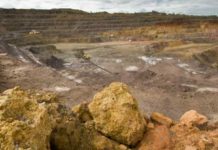
INTERNATIONAL Resources Holding (IRH), a subsidiary of UAE’s International Holding Company, said it had agreed to buy a controlling 56% stake in Canadian-listed tin producer Alphamin Resources for C$503m ($367m).
The acquisition sees IRH purchasing the majority stake from Tremont Master Holdings at C$0.70 per share. Alphamin said it was evaluating the impact of the announcemnet, if any.
Alphamin owns the Bisie tin mine located in the Democratic Republic of Congo’s mineral-rich eastern region. The mine is a significant player in global tin supply chains, producing approximately 6% of worldwide tin output annually. The Bisie resourced is also thought to contain other critical minerals including tantalum, tungsten, and coltan.
“Alphamin’s production profile aligns with our strategy of securing interests in high-quality mining assets,” said IRH CEO Ali Alrashdi.
The Alphamin acquisition follows IRH’s major investment last year in Zambia’s Mopani Copper Mines, where the company acquired a 51% stake for $1.1bn. Since that transaction, IRH has actively pursued additional deals focusing on critical minerals across Zambia and the Congo.
The strategy reflects a broader trend among Gulf oil producers, including the UAE and Saudi Arabia, to diversify revenue streams and secure critical metal supplies from Africa and Latin America. These moves position the nations to capitalise on the global transition toward renewable energy technologies.
Tin plays a crucial role in modern technology and the green energy transition, serving as an essential component in electronics manufacturing, renewable energy systems, and semiconductor production, said Reuters in a report on Wednesday. The metal’s importance has grown as demand for sustainable technologies continues to surge globally.
The acquisition comes after Alphamin faced operational challenges earlier this year when Rwanda-backed M23 rebels advanced near the Bisie mine site, forcing a temporary halt to mining operations. The incident highlighted the security risks associated with mining operations in the volatile eastern Congo region.











